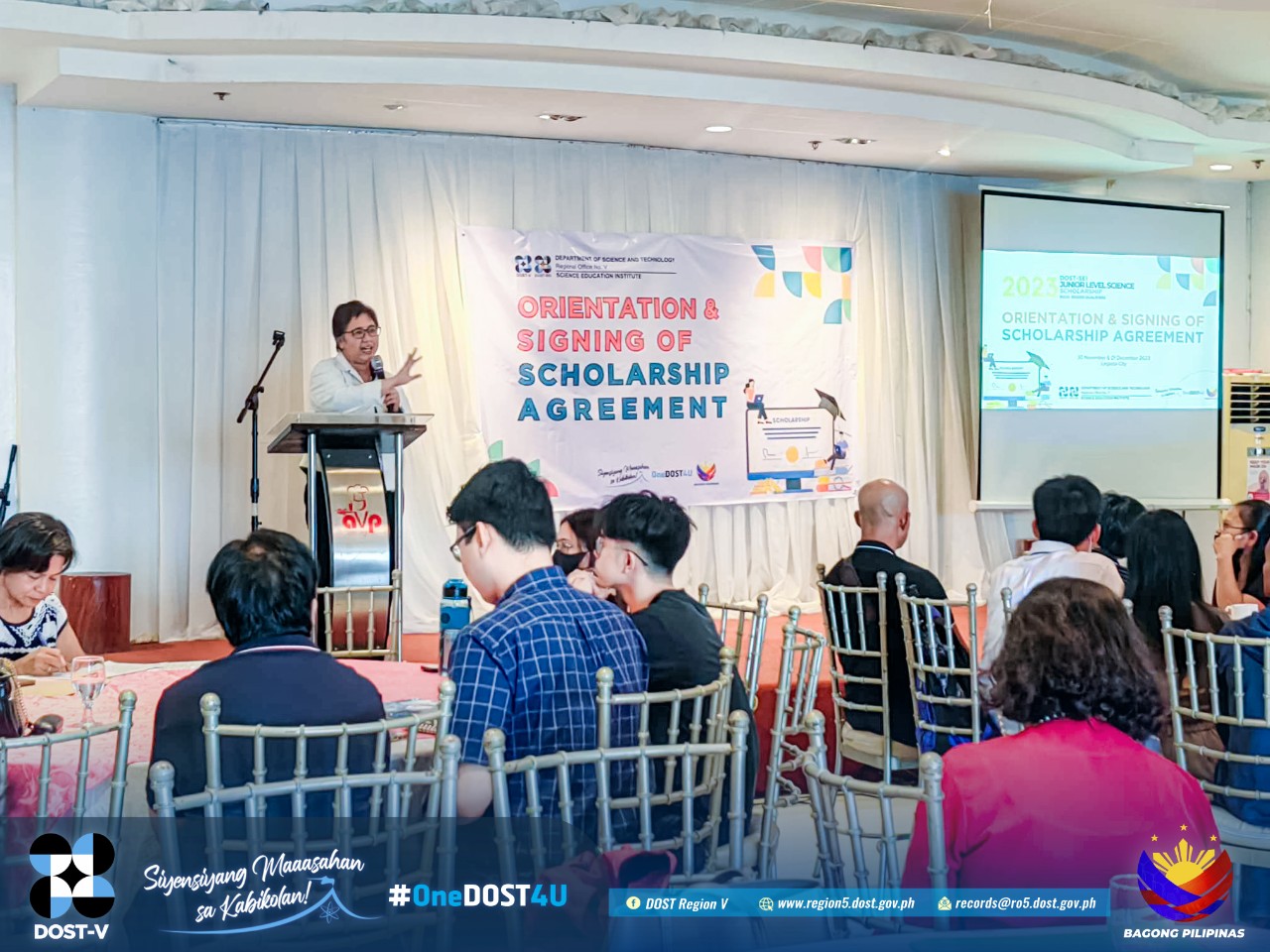Government financial programs are different aid projects designed to provide monetary assistance and support to individuals, families, or communities in need. They address various needs such as education, health, and emergency relief, aiming to alleviate financial burdens and improve quality of life.
These programs are helpful because they ensure that vulnerable populations receive essential support during times of crisis or financial difficulty. Understanding these programs helps individuals access available resources, ensuring they can benefit from the assistance designed to aid their specific situations.
Types of Government Financial Programs in the Philippines
Government financial assistance programs can be categorized into several general types based on their purpose and target beneficiaries. Here’s are the general classification of these government programs:
- Social Security Benefits: These programs provide financial support to individuals during specific life events such as illness, maternity, disability, retirement, and death.
- Health Insurance Programs: These programs aim to provide healthcare coverage and financial assistance for medical expenses.
- Educational Assistance Programs: These programs support education through scholarships and loans for students and their families.
- Housing Assistance Programs: Programs designed to assist individuals in acquiring, improving, or maintaining housing.
- Livelihood and Employment Programs: These programs provide support for income generation, skills training, and employment opportunities.
- Disaster Relief Programs: Programs that provide financial assistance during emergencies and natural disasters.
- Special Assistance Programs: Programs aimed at specific groups or situations, often addressing unique needs.
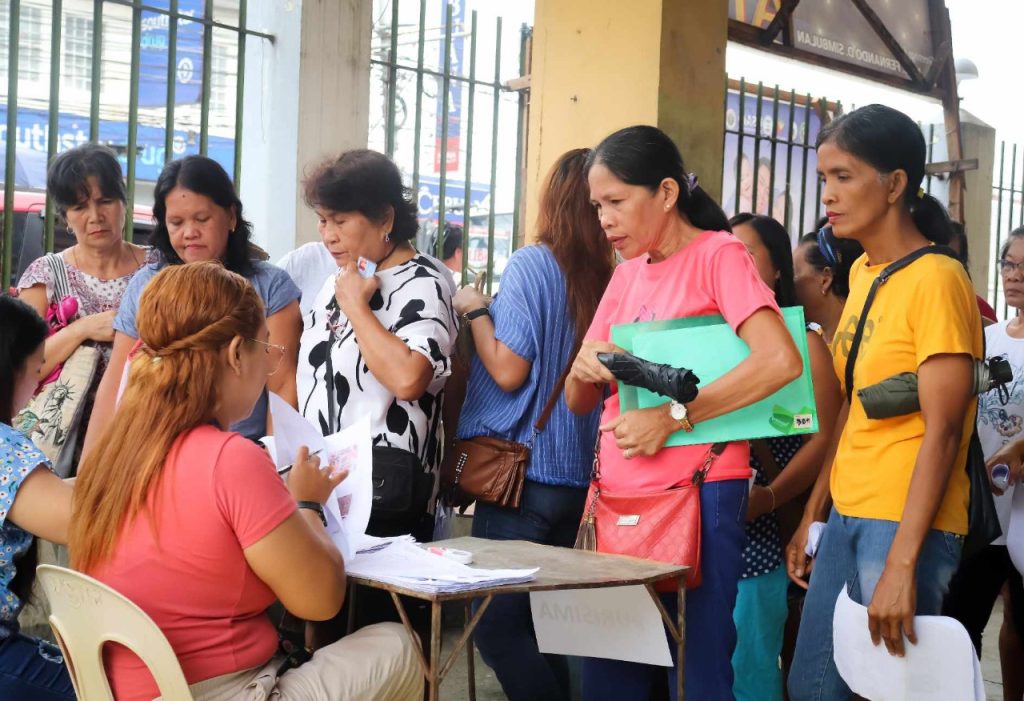
Having established the general categories of government financial assistance programs designed to meet various needs of the Filipinos, from providing social security benefits to ensuring access to healthcare and education, as well as offering support for housing, employment, and disaster relief, please see below for a detailed list of the programs available in the Philippines.
SSS Sickness Benefit
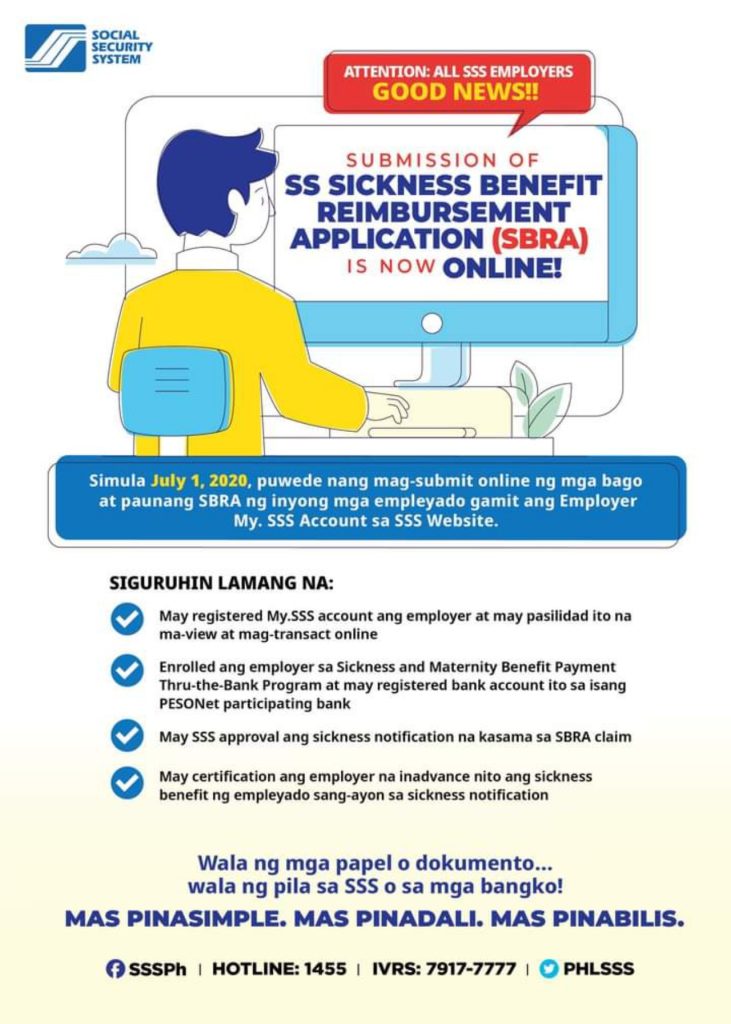
This is a daily cash allowance for SSS members who are unable to work due to illness or injury. It is for members who have paid at least three monthly contributions within the 12 months before the illness. The benefit provides up to 120 days of paid sick leave per calendar year to offer financial support during health-related absences from work.
SSS Maternity Benefit
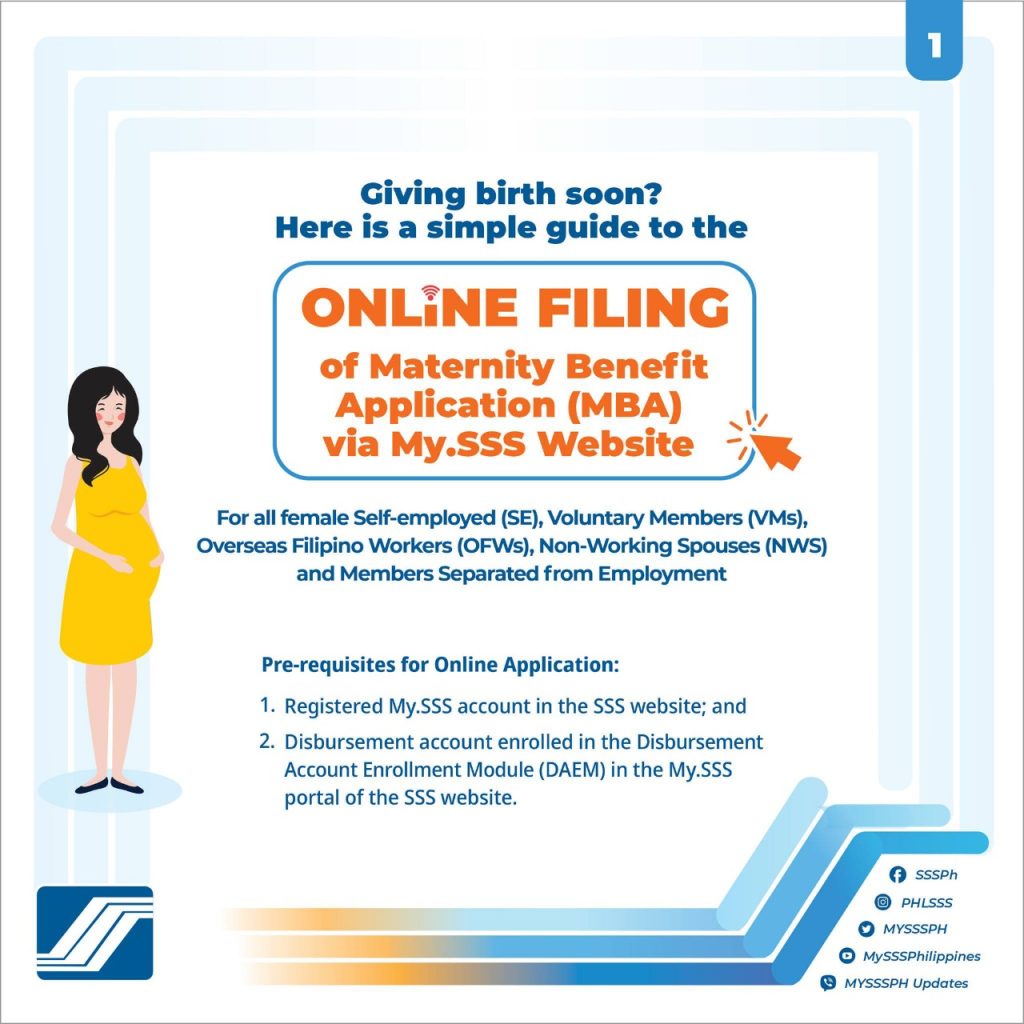
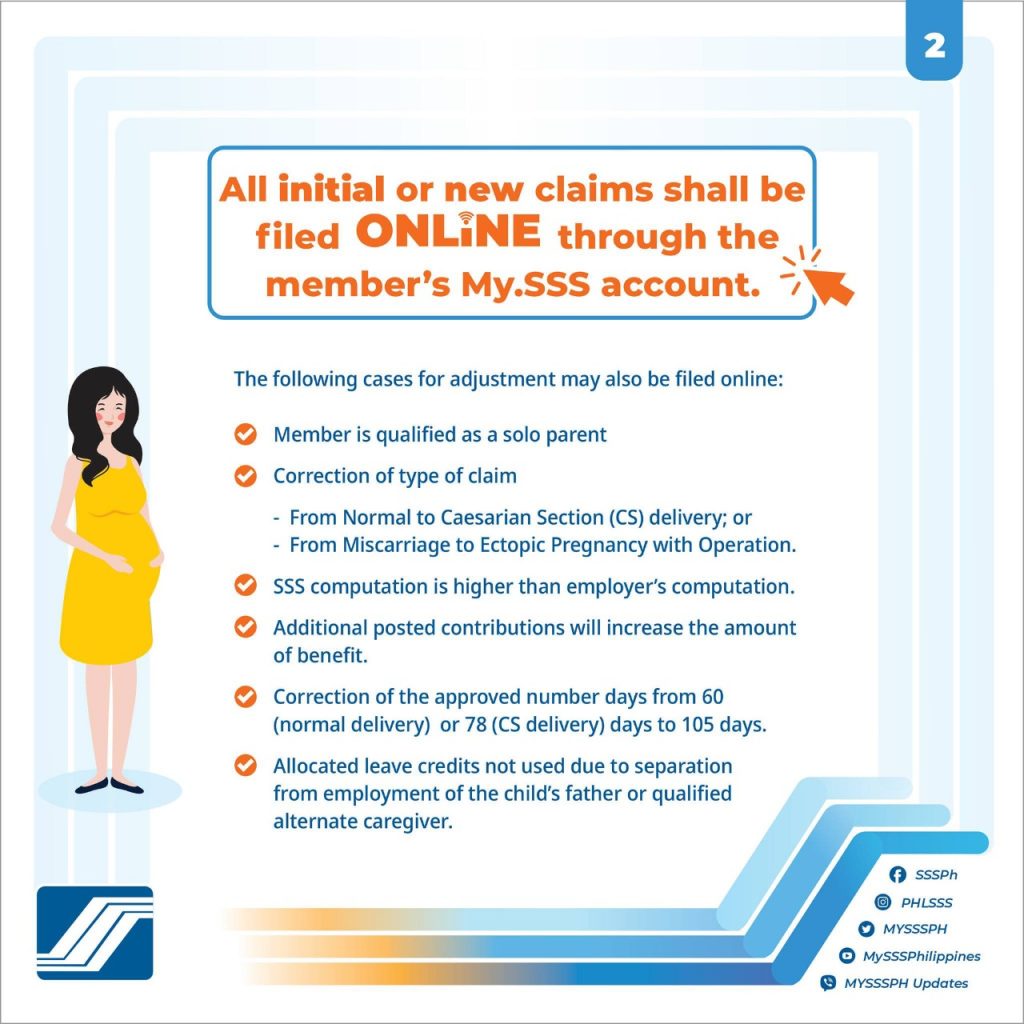
This program provides cash allowances to female SSS members who are unable to work due to childbirth or miscarriage. To qualify, members must have paid at least three monthly contributions in the 12 months prior to the pregnancy or miscarriage. The benefit covers up to 105 days for normal or cesarean deliveries and 60 days for miscarriage or stillbirth, providing full financial support during maternity leave.
SSS Disability Benefit
This benefit offers a monthly pension or lump sum to SSS members who are permanently disabled. It is for members with at least one monthly contribution before the disability and requires a medical evaluation for eligibility. The program provides financial security to disabled members, with benefits varying based on contribution history and years of service.
SSS Death Benefit
The death benefit provides financial support to the beneficiaries of deceased SSS members, either as a monthly pension or a lump sum. The amount depends on the member’s contributions, with primary beneficiaries receiving a monthly pension if the member contributed at least 36 months. It aims to ease the financial burden on the family of the deceased.
SSS Retirement Benefit
This is a monthly pension or lump sum for members who have reached the age of 60 and are no longer working. It is designed to offer financial security during retirement, with the pension based on the member’s contributions and average salary. Retirees can also opt for a lump sum payment and enjoy a 13th Month Pension every December.
SSS Funeral Benefit
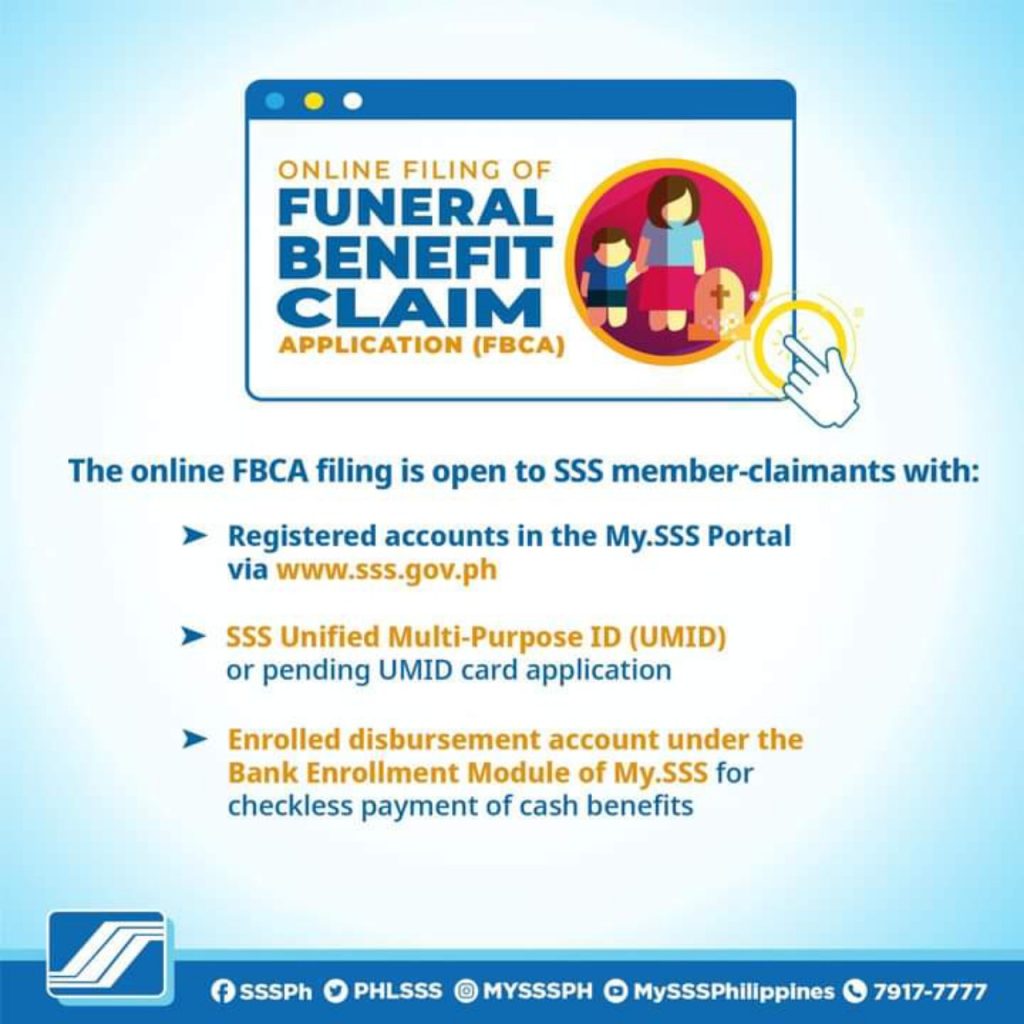
This benefit provides a cash grant to cover funeral expenses for deceased SSS members. The grant amount ranges from PHP 20,000 to PHP 40,000 depending on the member’s contributions and salary credit. Its purpose is to ease the financial burden on the family during the funeral.
SSS Unemployment Benefit
This cash benefit supports SSS members who have been involuntarily separated from employment. To qualify, members must have paid at least 36 monthly contributions, with 12 of these paid in the 18 months before losing their job. It provides financial assistance equal to 50% of the member’s monthly salary credit for up to two months.
Employees’ Compensation (EC) Program
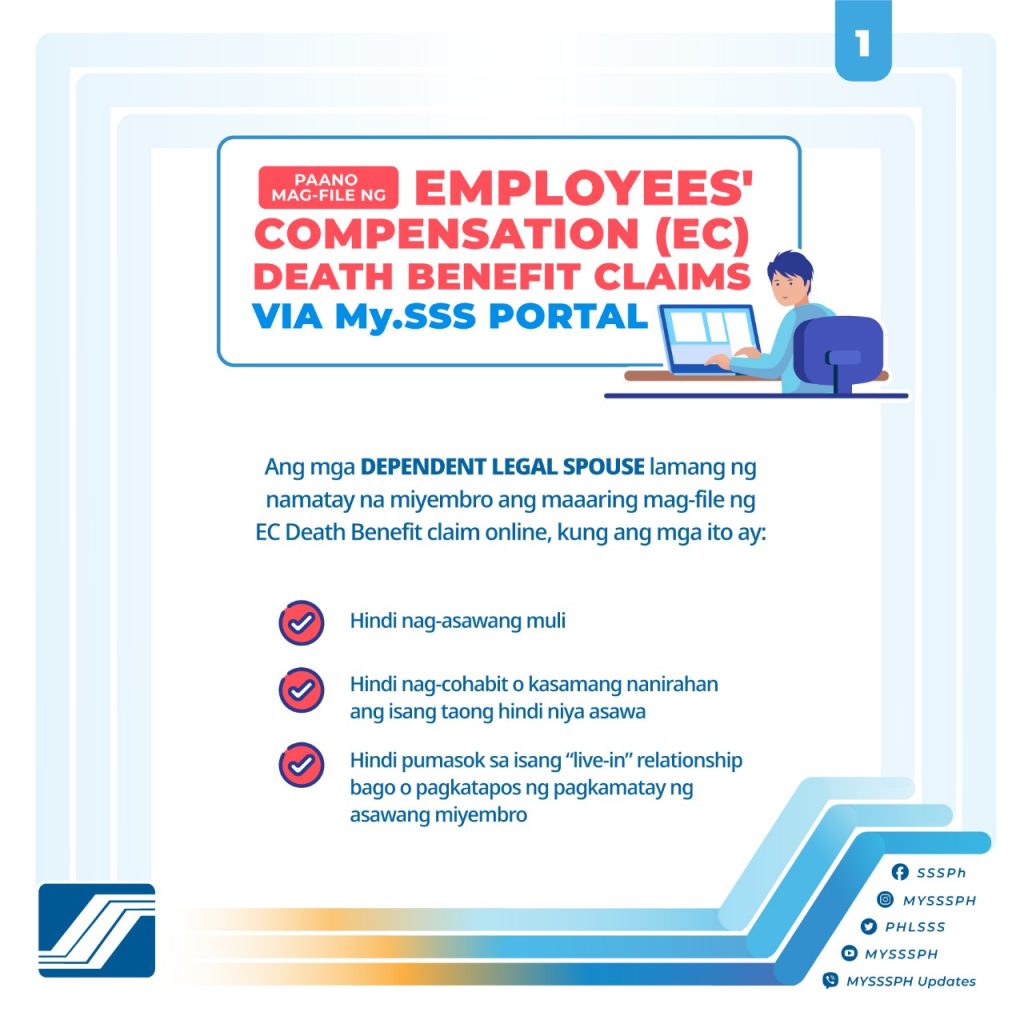
This program offers additional benefits to workers suffering from work-related injuries, sickness, or death. It complements the regular SSS benefits and covers private and government sector employees. The program includes cash benefits, medical services, and rehabilitation, aiming to assist workers affected by workplace hazards.
SSS Salary Loan
The Salary Loan is a short-term loan available to employed, self-employed, and voluntary SSS members. The loan amount is based on the member’s Monthly Salary Credit and contribution history, helping members meet their financial needs. It comes with a 10% annual interest and a repayment period of up to 24 months.
SSS Calamity Loan
This loan provides financial assistance to SSS members affected by natural disasters or emergencies. The loan amount is equivalent to one month’s salary credit, with a 24-month repayment period. It helps members recover financially after a declared state of calamity.
SSS Pension Loan
The Pension Loan program offers low-interest loans to SSS retiree pensioners, allowing them to borrow against their monthly pension. It helps pensioners address financial needs with a loan amount based on their pension, repayable over 6, 12, or 24 months. The loan has a 10% annual interest rate and is available to pensioners aged 85 or younger.
SSS Educational Loan
This program provides financial assistance for the education of SSS members or their dependents. Members who have paid at least 36 contributions can apply, and the loan covers tuition fees for degree and vocational courses. The loan is repayable over three to five years, with an interest rate of 6% per annum.
Direct Housing Loan Facility for OFWs
This loan program offers financial assistance to Overseas Filipino Workers (OFWs) for purchasing or constructing residential properties. It supports OFWs in investing in housing while working abroad, with loan amounts up to PHP 2,000,000. The loan is payable over a maximum of 15 years, with interest rates based on the property’s value.
SSS Housing Loan for Repairs and/or Improvements
This loan provides financial assistance to SSS members for repairing or improving their residential properties. The loan is payable over 20 years and offers fixed interest rates, helping members enhance their home’s value and livability. Borrowers can loan up to PHP 1,000,000, based on their ability to pay and property value.
PhilHealth – Medicare Program
Medicare offers health insurance for senior citizens, covering hospitalizations, outpatient services, and medical procedures. It is designed for senior citizens in need of affordable healthcare. This PhilHealth program ensures seniors receive essential medical care, including hospital stays, outpatient care, and medical procedures, promoting health and reducing medical costs for the elderly.
PhilHealth – Indigent Program
This program provides subsidized healthcare for low-income families, ensuring access to essential medical treatments. It is specifically designed for indigent families who struggle to afford healthcare. The program ensures essential treatments and services are accessible, supporting vulnerable families by reducing healthcare costs and improving access to necessary care.
PhilHealth – Konsulta Package
The Konsulta Package offers outpatient consultations, preventive care, diagnostic tests, and day surgeries. It targets individuals seeking regular health check-ups and early disease detection. It promotes preventive healthcare, providing routine check-ups, diagnostic tests, and coverage for day surgeries, helping individuals maintain better overall health and detect illnesses early.
PhilHealth – Primary Care Benefits
This package provides preventive care services, including vaccinations and health screenings. It is aimed at individuals who need regular health check-ups for early disease detection and management. The program encourages preventive healthcare, offering vaccinations and screenings to detect and manage diseases early, leading to improved health outcomes.
PhilHealth – Case Rate Package
This package offers pre-set financial coverage for specific medical cases and procedures, making healthcare costs more predictable. It benefits patients and healthcare providers by simplifying the cost structure for common medical procedures. By standardizing medical cost coverage, the program helps reduce uncertainty in medical expenses for both patients and healthcare providers.
PhilHealth – Z Benefit Package
The Z Benefit Package provides comprehensive financial support for high-cost medical conditions like cancer and kidney transplants. It is intended for patients dealing with expensive, life-threatening conditions. This program alleviates the financial strain of major treatments, offering coverage for conditions like cancer, kidney transplants, and orthopedic surgeries, ensuring patients receive life-saving care without overwhelming costs.
PhilHealth – SDG Package
The SDG Package aligns with the UN’s Sustainable Development Goals, covering treatments for conditions like HIV-AIDS, malaria, and tuberculosis. It is designed for patients diagnosed with specific health conditions identified under SDG. The program supports improved health outcomes by providing affordable treatment for diseases such as HIV-AIDS, tuberculosis, and malaria, contributing to broader global health objectives.
PhilHealth – Maternity Care Package
This package covers prenatal, delivery, and postnatal services, including care for newborns. It is designed for pregnant women and their newborns to ensure comprehensive maternal care. The program ensures that women receive full support during pregnancy, childbirth, and postpartum, reducing the risk of complications and improving maternal and newborn health outcomes.
PhilHealth – Dialysis Package
The Dialysis Package provides coverage for regular dialysis treatments for individuals with chronic kidney disease. It is intended for patients with chronic kidney disease who require ongoing dialysis. The program subsidizes dialysis sessions and necessary medications, helping patients manage their kidney condition and reducing the financial burden of long-term treatment.
Pag-IBIG Housing Loan
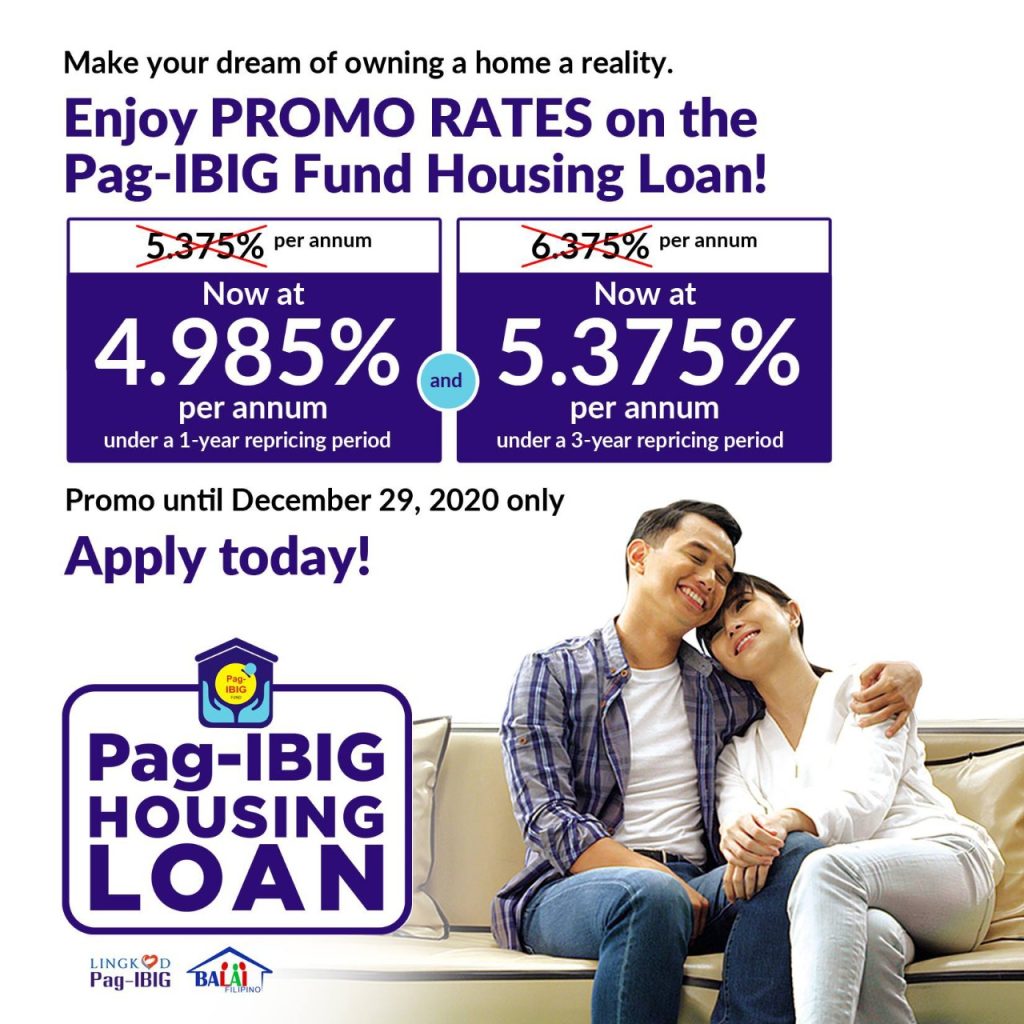
The Pag-IBIG Housing Loan is a program designed to help Filipinos purchase, construct, or improve residential properties. It is available to Pag-IBIG Fund members seeking to finance homes, with loan amounts up to P6 million and competitive interest rates. This program provides flexible payment options, allowing up to 30 years for repayment, with various insurance coverages included.
Pag-IBIG Home Equity Appreciation Loan (HEAL)
The Pag-IBIG HEAL program provides Pag-IBIG Fund members with existing housing loans an opportunity to borrow additional funds against the net value of their mortgaged property. This loan can be used for personal needs like home renovation or appliance purchases. It offers flexible payment terms of up to 30 years and interest rates depending on the repricing period chosen by the borrower.
Pag-IBIG Fund Affordable Housing Loan for Minimum-Wage Earners
This program is specifically tailored for minimum-wage earners, offering low-interest loans to help them acquire affordable housing. It caters to Pag-IBIG members earning up to P15,000 in NCR or P12,000 outside NCR, with loan amounts up to P750,000. The program offers flexible payment terms of up to 30 years and is secured by the properties purchased or improved.
Home Savers Program
The Home Savers Program helps Pag-IBIG Fund members prevent foreclosure by providing flexible solutions for housing loan payment difficulties. It includes restructuring options to extend loan terms, revaluation discounts for those with significant arrears, and penalty condonation for updated accounts. This program aims to ensure homeownership stability by offering customized payment plans for borrowers in financial distress.
4PH Program
The 4PH Program offers affordable housing options through public-private partnerships, providing Pag-IBIG Fund members access to government-subsidized housing projects. This program aims to help Filipinos purchase residential units with low interest rates and additional financial support from local governments. It is designed to provide in-city resettlement opportunities and ease the financial burden of homeownership.
Multi-Purpose Loan (MPL)

The Multi-Purpose Loan (MPL) is a cash loan program that allows Pag-IBIG members to access funds for various personal needs such as education, health, or home improvement. Members can borrow up to 80% of their total Pag-IBIG Regular Savings, with a 10.5% interest rate. The loan term ranges from 2 to 3 years, with flexible payment methods available, including salary deductions and online options.
Health and Education Loan Programs (HELPs)

The Pag-IBIG HELPs program provides financial assistance for education and healthcare expenses, directly disbursing funds to accredited schools and hospitals. It offers members up to 80% of their Pag-IBIG Regular Savings, with repayment terms of up to 36 months and a 10.5% interest rate. HELPs also include discounts at partner institutions, making education and health services more affordable.
Calamity Loan
The Pag-IBIG Calamity Loan offers financial relief to members affected by natural disasters and other emergencies in government-declared calamity zones. Members can borrow up to 80% of their total Pag-IBIG Regular Savings, with a 5.95% annual interest rate. This loan offers a repayment term of up to 3 years, with a grace period for amortization, helping members recover financially from disaster situations.
GSIS Scholarship Program (GSP)
The GSIS Scholarship Program (GSP) provides financial support to 400 college scholars who are children or dependents of GSIS members with low incomes. It covers up to Php40,000 for tuition and fees per year, with an additional Php3,000 monthly allowance. The program also offers incentives for graduates with honors, aiming to reduce dropout rates and provide greater access to quality education for underprivileged students.
GSIS Adopt-a-School Program (ASP)
The Adopt-a-School Program (ASP) offers Php200,000 worth of assistance to public schools in low-income areas, focusing on improving physical infrastructure and technology. Implemented in partnership with the Department of Education, the program has benefited 49 schools since 2014. GSIS also supports Brigada Eskwela by involving staff in voluntary efforts to repair and clean schools, donating supplies, and improving facilities before the start of the school year.
Cash Grant to Medical Students Enrolled in State Universities and Colleges (CGMS-SUCs)
This program offers financial assistance to medical students enrolled in select State Universities and Colleges (SUCs) in the Philippines. It is designed to reduce the financial burden of pursuing a Doctor of Medicine degree by covering tuition and providing subsidies. The program aims to support Filipino students aspiring to become doctors through partnerships between CHED and the Department of Budget and Management (DBM).
Stipendium Hungaricum Scholarship Program
A scholarship established by the Hungarian Government, it offers foreign students, including Filipinos, the opportunity to study in Hungary. It promotes international education and cross-cultural exchanges while providing financial support through free tuition, monthly stipends, and accommodation. The program aims to attract students in fields such as agriculture, medicine, and natural sciences to foster international collaboration.
CHED Merit Scholarship Program (CMSP)
The CHED Merit Scholarship Program is designed for academically talented and underprivileged students, persons with disabilities, and dependents of solo parents. It provides financial support for undergraduate studies in priority fields recognized by CHED. The program covers tuition fees, offers living stipends, and book allowances, ensuring access to higher education for deserving Filipino students.
CHED Scholarship Program for Future Statisticians (ESTATISTIKOLAR)
This program addresses the need for more statisticians in the Philippines by offering scholarships to students studying Statistics or Applied Statistics. Targeted toward underprivileged groups, the program aims to increase the number of skilled professionals in this field. It provides financial support through tuition coverage, stipends, and other allowances to qualified Filipino students.
Scholarship Program for Coconut Farmers and their Families (CoScho)
The CoScho program offers educational opportunities to coconut farmers and their dependents, aiming to improve the industry’s productivity and alleviate poverty. It provides financial aid through stipends, book allowances, and other educational support. Graduates are required to serve in the Philippines to contribute to the development of the coconut industry.
Scholarship for Children and Dependents of Sugarcane Industry Workers and Small Sugarcane Farmers
This scholarship supports the educational pursuits of the children and dependents of workers and small-scale sugarcane farmers. It provides financial assistance for both undergraduate and graduate studies in agriculture and related fields. The program aims to uplift the sugarcane industry by educating its future workforce and offering substantial stipends, allowances, and return service obligations.
Agricultural Competitiveness Enhancement Fund – Grants-in-Aid for Higher Education Program (ACEF-GIAHEP)
ACEF-GIAHEP promotes agricultural and fisheries development by providing financial support to students in agriculture-related programs. It offers subsidies for tuition and living expenses to students in both private and public institutions. The program’s goal is to increase the number of graduates in agriculture, forestry, and fisheries to boost the sector’s competitiveness.
Research, Innovation, and Extension Grants-in-Aid (GIA) Program
The GIA Program funds research and extension projects in Philippine higher education institutions to enhance innovation and address key national challenges. It focuses on themes such as health, climate change, and food security, offering competitive grants for research and development. The program aims to build institutional capacity in research and support initiatives that positively impact communities.
Philippine-California Advanced Research Institutes (PCARI)
The PCARI project offered by CHED fosters research collaboration between Philippine universities and leading California institutions. It enhances faculty skills through scholarships, training, and joint research in fields like information infrastructure and health innovation. The program aims to translate research into practical applications, improving the research landscape in Philippine universities.
DOLE Tulong Panghanapbuhay sa Ating Disadvantaged / Displaced Workers (TUPAD)
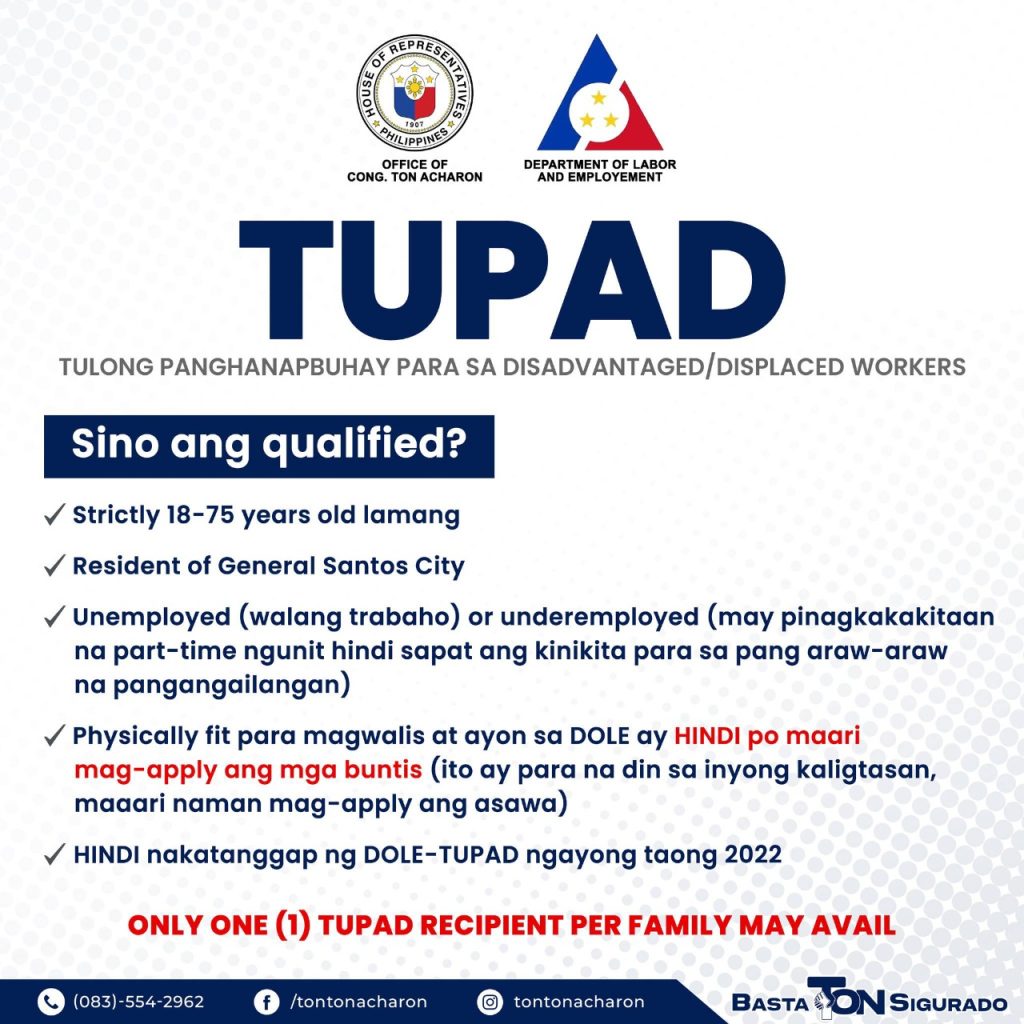
DOLE TUPAD is a community-based program providing temporary employment to workers in the informal sector who are underemployed or displaced by crises like the pandemic. It aims to help these individuals by offering jobs that range from 10 to 90 days, with wages based on the local minimum wage. The program helps workers stabilize their income while improving their skills for future employment opportunities.
Ayuda sa Kapos ang Kita Program (AKAP) for OFWs
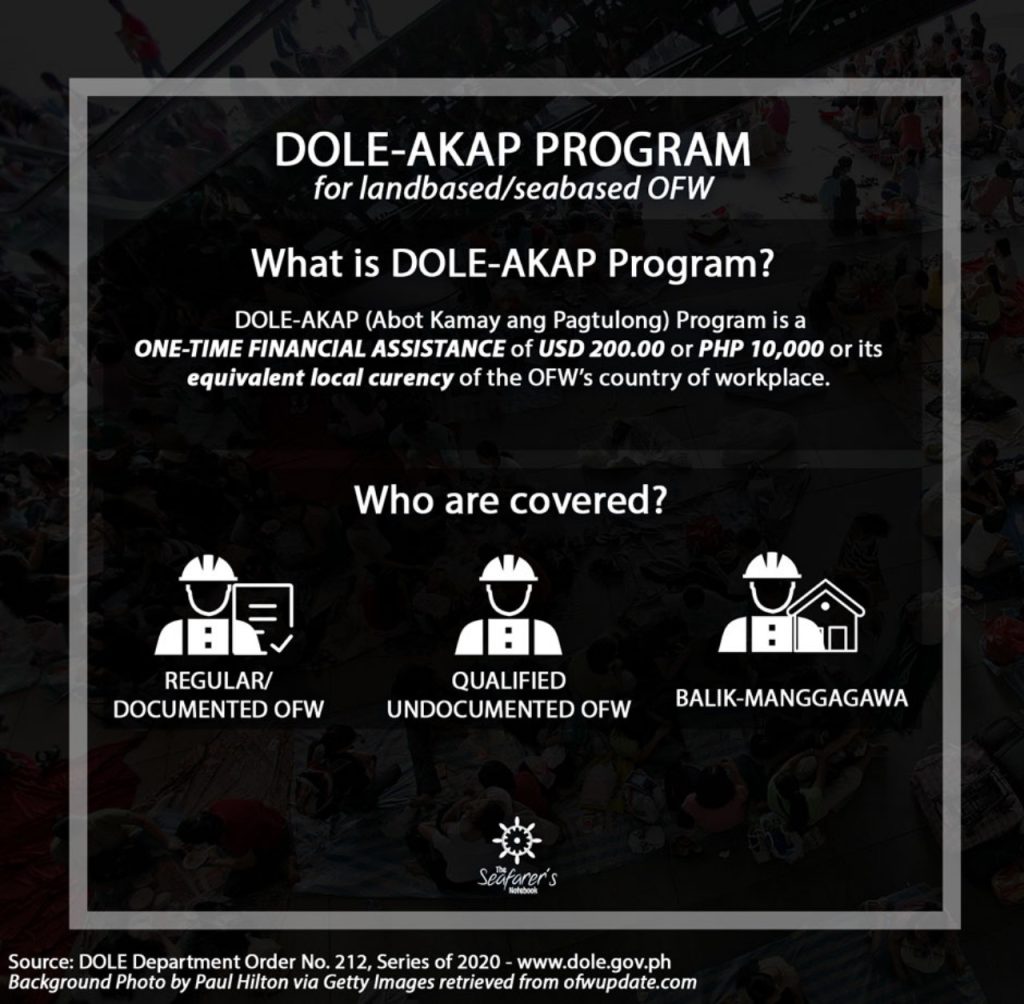
AKAP is a financial assistance program for Overseas Filipino Workers (OFWs) who lost their jobs due to the COVID-19 pandemic. It offers a one-time cash aid of US$200 (around Php 10,000) to help OFWs manage urgent financial needs. This program aims to support displaced OFWs and their families by providing additional forms of aid like medical and funeral assistance.
Special Program for Employment of Students (SPES)
SPES is a program designed to offer temporary employment to students from low-income families, helping them earn income during school breaks. This initiative supports students’ educational expenses while providing them with work experience to improve their future employability. The program also contributes to workforce development by encouraging skill growth among young people.
DOLE Integrated Livelihood Program (DILP)
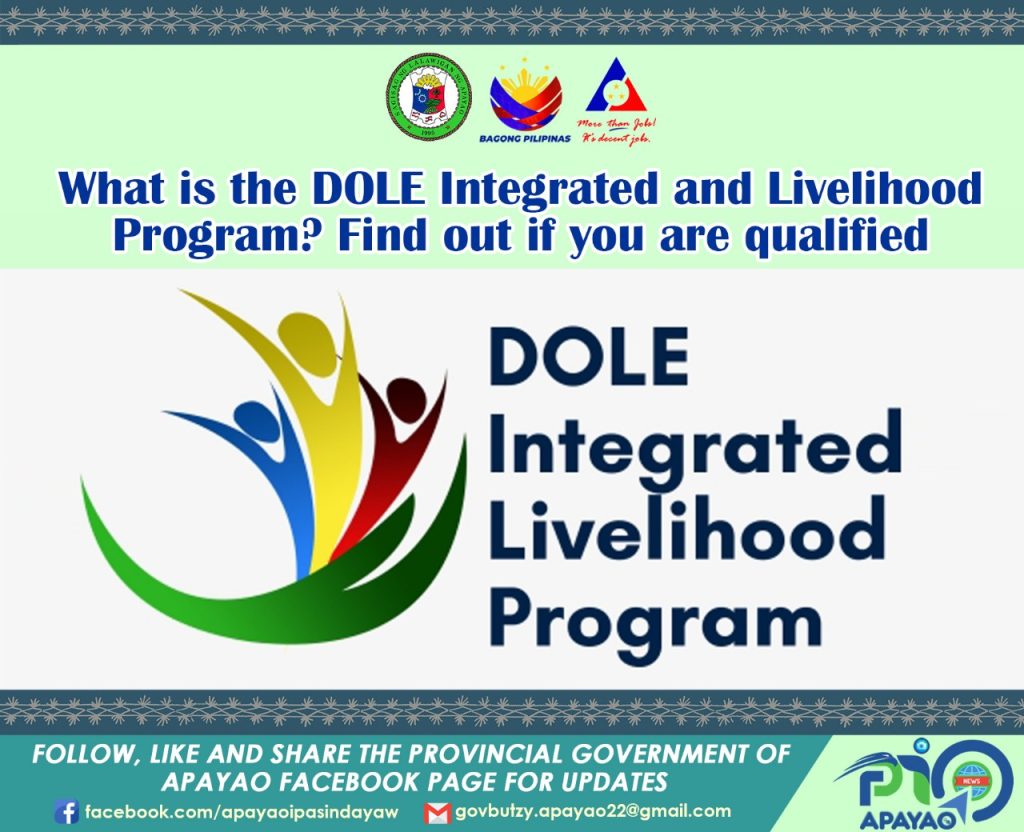
DILP, also called the Kabuhayan Program, provides financial aid and skills training to marginalized workers, helping them establish sustainable livelihoods. The program focuses on empowering disadvantaged groups, including displaced workers and the self-employed, to enhance their income-generating potential. It aims to reduce poverty and promote economic stability through entrepreneurial projects.
Serbisyo Para Sa Mobile Vendors (Nego-Kart)
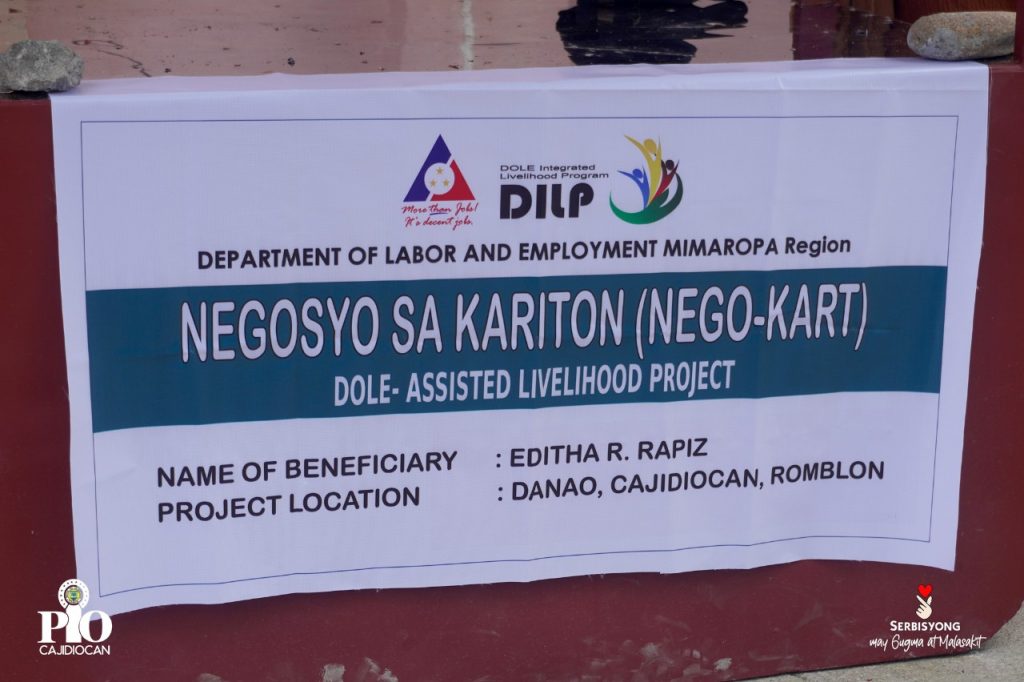
The Nego-Kart program supports urban mobile vendors by providing them with vending carts, capital, and business management training. It helps vendors improve their livelihoods, ensuring their earnings meet minimum wage standards, while also assisting them in formalizing their businesses through permits. The program is a collaborative effort involving local governments and other partners to enhance vendors’ financial stability.
DOLE Adjustment Measures Program (DOLE AMP)
DOLE AMP aims to improve the skills of workers through funding for skills training and capacity-building projects, helping them adapt to labor market changes. The program supports both workers and enterprises in enhancing productivity, with a focus on job preservation and competitiveness. It plays a key role in workforce development by offering training to safeguard jobs during economic disruptions.
Disability and Dismemberment
The OWWA Disability and Dismemberment program provides financial aid to OFWs who suffer injuries or disabilities while working abroad. Active OWWA members can receive up to Php 50,000 for partial disabilities and up to Php 100,000 for total permanent disabilities. This assistance helps OFWs cope with unexpected accidents and continue supporting their families despite injuries.
Supplemental Medical Assistance for OFWs (MEDplus)
MEDplus is a joint program by OWWA and PhilHealth that offers supplemental medical support to OFWs facing hospitalization due to serious illnesses. Eligible OFWs can receive up to Php 50,000 to help cover medical expenses beyond what PhilHealth offers. This program aims to reduce the financial burden of serious medical conditions on OFWs and their families.
Death and Burial Benefits
OWWA provides financial assistance to the dependents of deceased OFWs who were active members at the time of death. The program offers up to Php 100,000 for natural deaths, Php 200,000 for accidental deaths, and an additional Php 20,000 for burial expenses. This support eases the financial challenges of bereavement for OFW families.
Welfare Assistance Program (WAP)
The Welfare Assistance Program offers cash relief to OFWs and their families who are not eligible for other OWWA benefits. It provides aid for situations such as calamities, bereavement, medical needs, disabilities from accidents or crimes, and displacement due to economic or political crises. Both active and inactive members can access this program to help during unexpected hardships.
Education for Development Scholarship Program (EDSP)
The EDSP is a competitive scholarship providing up to Php 60,000 annually for 1,000 dependents of OFWs pursuing higher education. It allows students to enroll in their chosen course and school, provided they meet academic standards and pass the DOST qualifying exams. The scholarship supports the education of OFW dependents, ensuring they receive quality higher education.
OFW Dependent Scholarship Program (ODSP)
ODSP provides financial assistance to OFW dependents from families earning $600 or less per month. Beneficiaries receive up to Php 20,000 per academic year to cover tuition for four- or five-year courses at state universities or colleges. This program supports low-income OFW families in ensuring their dependents receive higher education.
Education and Livelihood Assistance Program (ELAP)
ELAP offers educational and livelihood support to the dependents of deceased OFWs. The program provides educational assistance to the eldest child for primary, secondary, and tertiary education, along with a Php 15,000 livelihood grant for the surviving spouse. ELAP helps families maintain stability following the death of an OFW.
Skills for Employment Scholarship Program (SESP)
SESP offers financial assistance to OFWs and their dependents for completing short-term technical or vocational courses. The program covers tuition fees up to Php 14,500 for one- to two-year courses and Php 7,250 for six-month courses. It aims to enhance the skills of OFWs and their dependents, improving their employment prospects.
Seafarer’s Upgrading Program (SUP)
The Seafarer’s Upgrading Program provides training and financial assistance to Filipino seafarers, helping them meet international maritime standards. Beneficiaries can receive grants between Php 1,200 to Php 7,500 for approved courses. This program supports seafarers in improving their skills and maintaining competitiveness in the global maritime industry.
Balik Pinas! Balik Hanapbuhay! Program
The Balik Pinas! Balik Hanapbuhay! Program provides livelihood support to distressed or displaced OFWs returning to the Philippines. Eligible members can receive up to Php 20,000 in cash grants, along with entrepreneurship training and marketing assistance to help start small businesses. The program helps OFWs reintegrate into society and maintain financial independence.
Tulong Pangkabuhayan sa Pag-unlad ng Samahang OFWs (Tulong – PUSO)
Tulong – PUSO is a program that supports OFW groups in starting or expanding businesses through financial grants and business development resources. Grants range from Php 150,000 to Php 1,000,000 depending on the size of the group. The program fosters collective entrepreneurship among OFWs, helping them build sustainable livelihoods.
Overseas Filipino Workers – Enterprise Development and Loan Program (OFW-EDLP)
OFW-EDLP provides financial assistance for OFWs to start or expand businesses, offering loans from Php 100,000 to Php 5,000,000. Borrowers must complete entrepreneurial training and meet equity requirements, with loan terms of up to 7 years. The program empowers OFWs to achieve financial independence through entrepreneurship.
DOLE-OWWA AKAP for OFWs
The DOLE-OWWA AKAP program offers a one-time cash aid of Php 10,000 to OFWs who lost their jobs due to the COVID-19 pandemic. The financial assistance helps cover basic needs without repayment requirements. It is available to displaced OFWs in priority countries and can be accessed online or through POLO-OWWA offices.
Tertiary Education Subsidy for Dependents of Repatriated OFWs (Tabang OFW)
Tabang OFW provides a one-time Php 30,000 financial grant to college-level dependents of repatriated OFWs affected by the COVID-19 pandemic. The program aims to support OFW families by ensuring the continuation of higher education for their dependents. It was implemented during the 2020-2021 academic year as part of the government’s response to the pandemic.
OWWA Rebate Program
The OWWA Rebate Program offers long-term members, who have contributed for 10 or more years without using other benefits, a partial refund of their contributions. Rebates range from Php 941 to Php 13,000 based on contribution history. Beneficiaries can use rebates for educational support or to renew OWWA membership.
Educational Assistance by Scholarship in Emergencies (Project EASE)
Project EASE provides a Php 10,000 annual scholarship for up to four years to college-level dependents of OFWs who lost their jobs due to the COVID-19 pandemic. This program helps ease the financial strain on OFW families and ensures their dependents can continue their education during crises. The initiative is part of OWWA’s broader COVID-19 relief efforts.
Tuloy-Aral Project (TAP)
The Tuloy-Aral Project is an educational initiative providing financial support to children of former OFWs and marginalized families. With the help of OFW donors, the program funds school expenses for eligible children, ensuring they receive quality education. It also offers extended support for college students through the Tuloy Kolehiyo program.
Pantawid Pamilyang Pilipino Program (4Ps)
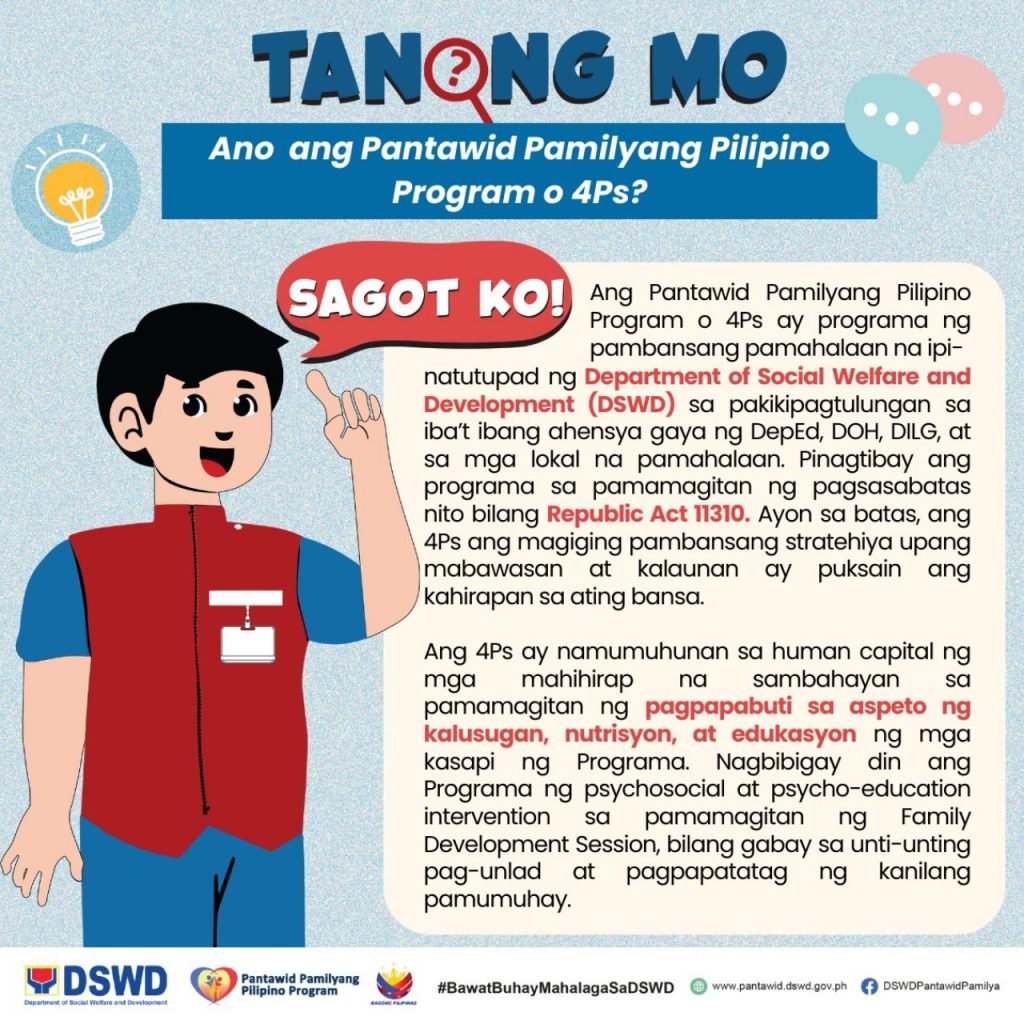
The Pantawid Pamilyang Pilipino Program (4Ps) is a conditional cash transfer initiative by the DSWD aimed at improving the health, education, and nutrition of poor families. It targets households with children aged 0 to 18 and was institutionalized under Republic Act No. 11310. The program provides financial support for health, education, and rice subsidies, limited to a maximum of seven years to optimize its impact on poverty reduction.
Recovery and Reintegration Program for Trafficked Persons (RRPTP)
The RRPTP offers comprehensive assistance to trafficked individuals, providing services such as counseling, skills training, and financial support. It facilitates their recovery and reintegration into society through direct services like basic necessities, medical aid, and job placement. This program aims to help victims rebuild their lives and supports those involved in ongoing legal cases.
Social Pension (SocPen) for Indigent Senior Citizens
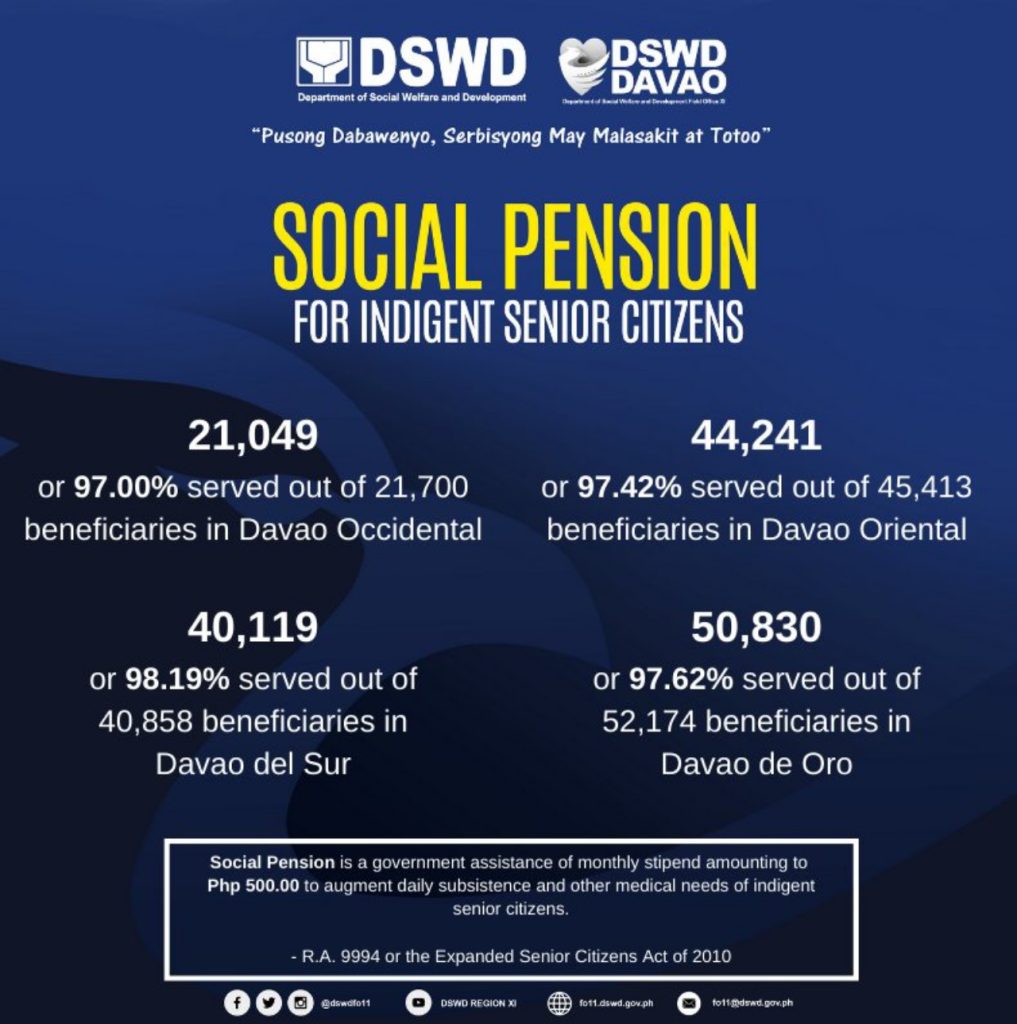
The Social Pension (SocPen) provides financial aid to elderly Filipinos who are frail, disabled, or without steady income, as mandated by Republic Act No. 9994. Eligible senior citizens receive a monthly stipend of PHP 500 to improve their well-being and reduce vulnerability to neglect and abuse. This assistance helps cover basic needs and enhances the quality of life for indigent seniors.
Centenarian Act Implementation
The Centenarian Act honors Filipino citizens who reach 100 years of age by granting them a one-time cash gift of ₱100,000 and a letter from the President. The program also provides local incentives and awards a Posthumous Plaque of Recognition for deceased centenarians. Amendments in 2023 added cash incentives for senior citizens aged 80 to 95, recognizing their contributions and longevity.
Assistance to Individuals in Crisis Situations (AICS)
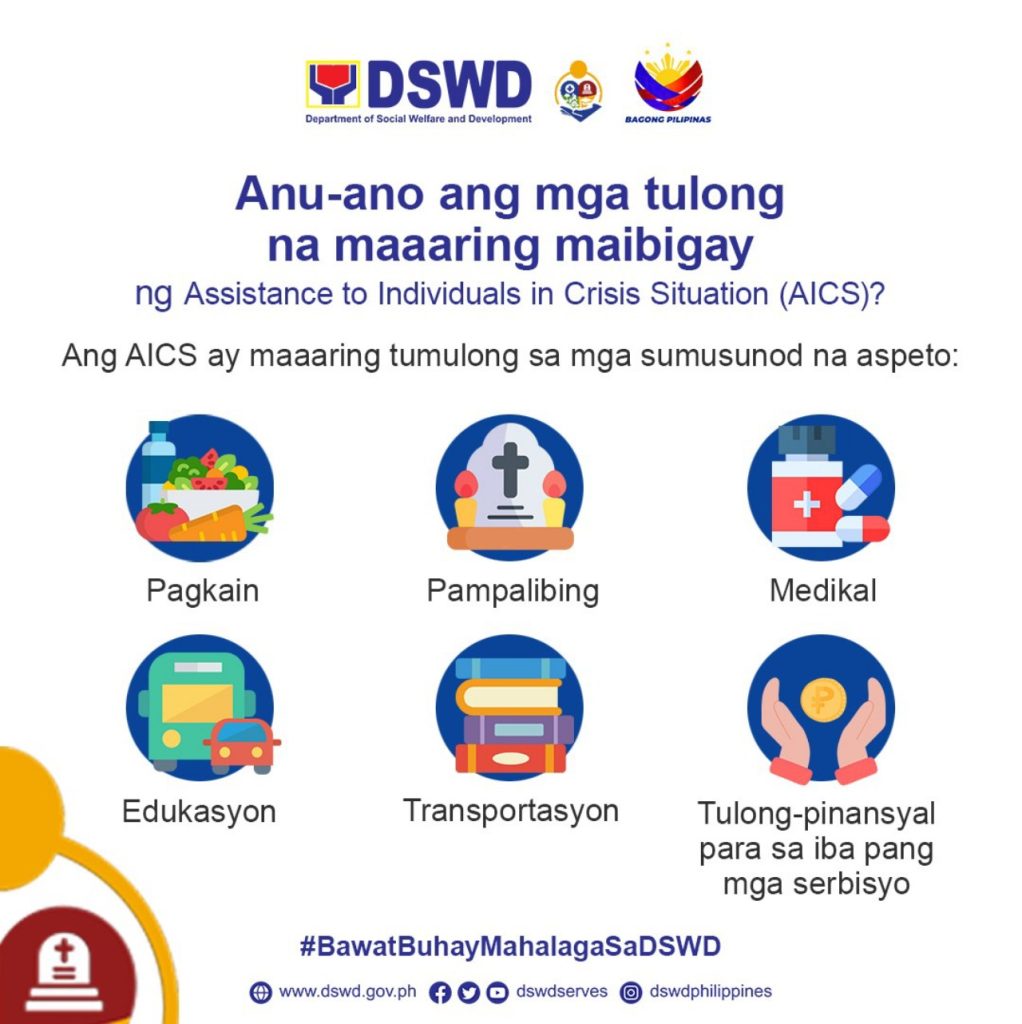
The AICS program provides financial, medical, educational, and material assistance to individuals and families in crisis. It offers help with hospital bills, funeral expenses, educational needs, and transportation costs, among other emergencies. The program ensures immediate support for those facing economic difficulties or unforeseen challenges through streamlined applications at local DSWD offices.
Lingap at Gabay Para (LinGaP) sa May Sakit (MaSa)
LinGaP sa MaSa assists financially challenged individuals with medical expenses for treatments, prosthetics, and necessary medical procedures. The program, funded by the President’s Socio-Civic Projects Fund, prioritizes marginalized groups and provides up to PHP 75,000 per case per year. Its goal is to help cover healthcare costs for those unable to afford necessary medical care.
National Household Targeting System for Poverty Reduction (NHTS-PR) or Listahanan
Listahanan is a data management system that identifies poor households in the Philippines to ensure targeted social services. It uses home visits and statistical models to accurately assess poverty status, minimizing errors in the allocation of resources. This system plays a key role in efficiently delivering social protection programs to the most vulnerable families.
Sustainable Livelihood Program (SLP)
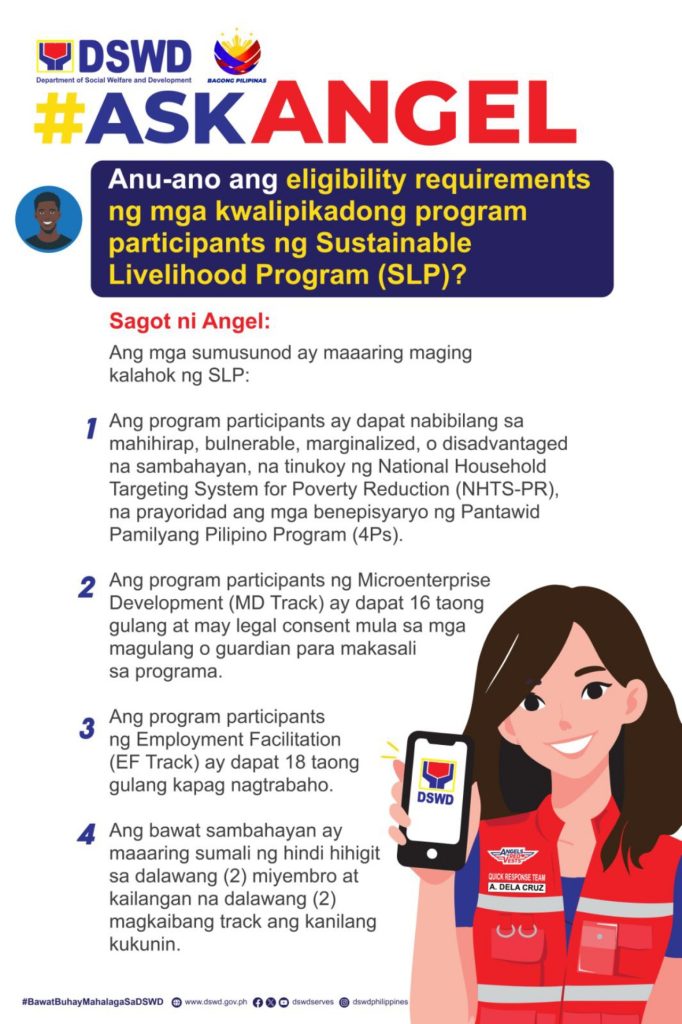
The SLP is a community-driven initiative that supports disadvantaged households in building sustainable livelihoods through Microenterprise Development and Employment Facilitation. The program provides financial assistance, skills training, and employment support to improve long-term economic stability. By offering seed capital, training, and grants, it aims to enhance household income and promote self-sufficiency.
KALAHI-CIDSS-National Community Driven Development Program (KC-NCDDP)
KC-NCDDP empowers communities by engaging them in poverty reduction projects that improve access to services and strengthen local governance. It focuses on building infrastructure, providing basic services, and fostering sustainable development in poor municipalities. The program promotes community participation in decision-making and aims to enhance local planning and service delivery.
Targeted Cash Transfer (TCT) Program
The TCT Program provides ₱500 monthly financial aid for six months to low-income households affected by economic challenges, including rising fuel costs. It targets the bottom 50% of Filipino households, particularly those enrolled in the 4Ps and other cash transfer programs. The program seeks to mitigate financial hardships and improve household stability during times of economic downturn.
NCSC WHEREB (Wellness, Health, Emergency Response, and Benefits)
The NCSC WHEREB is a program focused on the health and safety of senior citizens. It provides emergency support, medical alert systems, and access to healthcare professionals to ensure seniors’ well-being. The program aims to help seniors feel secure, providing them with the necessary tools to manage health emergencies and maintain a sense of safety.
SOCPEN (Social Pension, Centenarian Benefits, Support to Disabled)
SOCPEN is a financial assistance program implemented by the NCSC in partnership with the DSWD for elderly individuals who are unable to earn an income. It offers a regular allowance to eligible seniors, helping reduce their dependence on younger family members for financial support. The program enhances the quality of life for seniors by ensuring they have a stable source of income in their later years.
Medical Assistance Program (MAP)
MAP is a PCSO initiative that offers financial aid for medical expenses to individuals with limited resources. It supports a wide range of medical needs, including treatments, consultations, and medications, through partnerships with hospitals and health facilities. The program aims to reduce the financial burden of healthcare, improving access and health outcomes for underserved Filipinos.
Individual Medical Assistance Program (IMAP)
IMAP, a component of MAP, provides targeted financial support for medical expenses using a classification system prescribed by health authorities. It offers varying levels of coverage based on the patient’s hospital classification and focuses on timely assistance for hospitalization and treatments. This program ensures that individuals, regardless of their economic status, can access necessary medical care.
Institutional Partnership Program (IPP)
IPP enhances the capabilities of welfare agencies and charitable medical facilities through financial grants. It aims to extend charity services and improve healthcare delivery in impoverished communities by partnering with local organizations. The program bridges government resources and community needs, fostering effective health and welfare solutions.
Direct Financial, Funeral, and Medical Assistance
This program provides immediate cash assistance for urgent medical emergencies and funeral expenses. It offers timely financial support to alleviate the burden of critical situations, ensuring that necessary healthcare services and funeral costs are managed promptly. The program serves as a vital resource during emergencies, supporting individuals and families in need.
Calamity Assistance Program (CAP)
CAP delivers financial aid to families and individuals affected by disasters and calamities. It collaborates with Local Government Units and health facilities to provide appropriate forms of support for recovery and rebuilding efforts. The program aims to ensure timely assistance and facilitate community resilience during emergencies.
PAGCOR – Medical Assistance for Cancer Patients
PAGCOR provides financial aid specifically for cancer patients to cover chemotherapy, radiation therapy, and medications. This program is aimed at individuals undergoing cancer treatment who require financial support. It alleviates the financial burden of essential cancer treatments and helps cover medication costs.
PAGCOR – Financial and Medical Assistance
PAGCOR offers financial support for healthcare infrastructure and individual medical needs. This program benefits hospitals, local governments, and individuals facing medical expenses. It funds hospitals and medical facilities, provides aid for individual healthcare costs, and supports key health programs.
DHSUD – Pambansang Pabahay Para sa Pilipino (4PH) Program
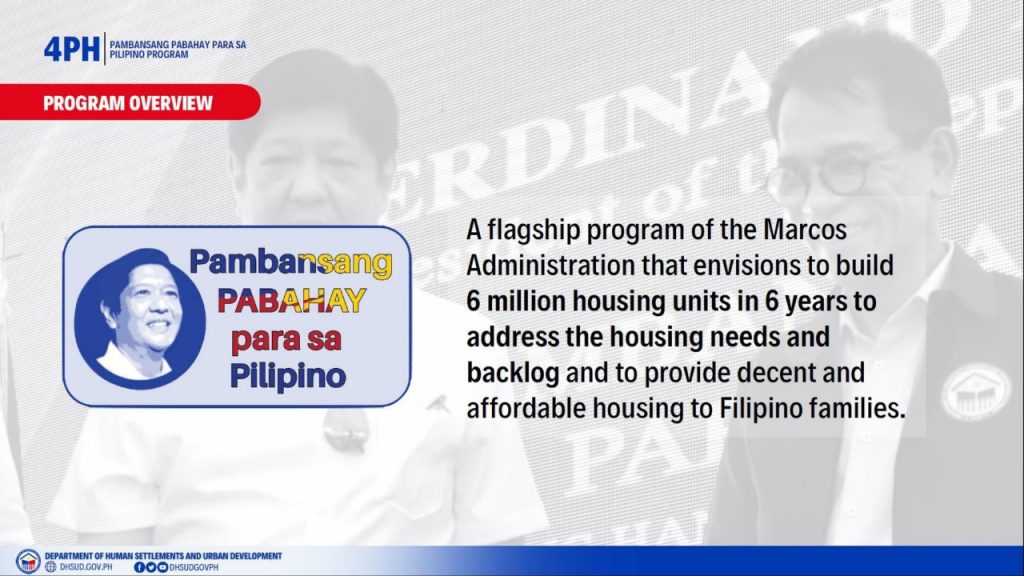
A major housing initiative by DHSUD focused on building affordable homes for low-income families. This program targets low-income families in need of housing. It aims to construct six million homes by 2028, providing affordable housing solutions.
NHA – Resettlement Assistance Program to LGUs (RAP-LGU)
NHA provides financial and technical support to local government units for urban development and housing. This program supports local governments working on urban and housing projects. It aids in urban development efforts and enhances local housing initiatives.
NHA – Emergency Housing Assistance Program (EHAP)
EHAP provides immediate housing support to families affected by disasters. This program is for families impacted by emergencies requiring immediate housing solutions. It offers cash assistance or construction materials to quickly address housing needs after disasters.
DOST R.A. 7687 Undergraduate S&T Scholarship
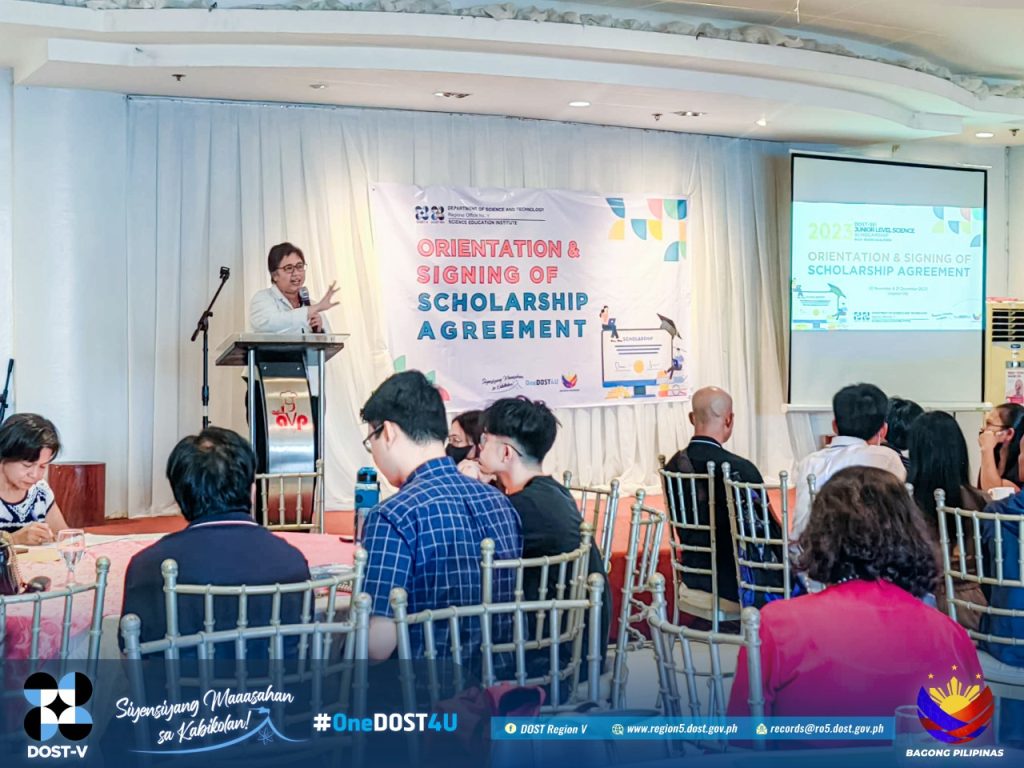
R.A. 7687 is a DOST initiative providing scholarships to talented students from low-income families who aim to study science, technology, and engineering. The program’s goal is to support the education of promising students in these fields. Benefits include coverage for tuition, monthly stipends, book and transportation allowances.
DOST-SEI Merit Scholarship
The DOST-SEI Merit Scholarship targets students with exceptional abilities in science and mathematics, with the aim of fostering future leaders in science and technology. It encourages students to pursue careers in these fields by providing financial support. The benefits include tuition coverage, monthly stipends, and allowances for books and transportation.
DOST-PCAARRD GREAT Program
The GREAT Program, part of the DOST-PCAARRD Human Resource Development Program, offers financial and technical support to graduate students involved in research projects. Its purpose is to aid in the completion of graduate degrees while enhancing research capabilities in agriculture and resource development. Benefits include tuition coverage, substantial monthly allowances, research grants, and additional support for thesis or dissertation costs.
CFO Overseas Filipino Centenarian Awards and Incentives
The CFO Overseas Filipino Centenarian Awards and Incentives program provides a one-time cash gift of ₱100,000 and a congratulatory letter from the President to Filipino centenarians abroad. This initiative honors the longevity and contributions of Filipino centenarians, with additional local incentives potentially provided. Applications are managed through Philippine embassies and consulates.
Malasakit Center Medical Assistance
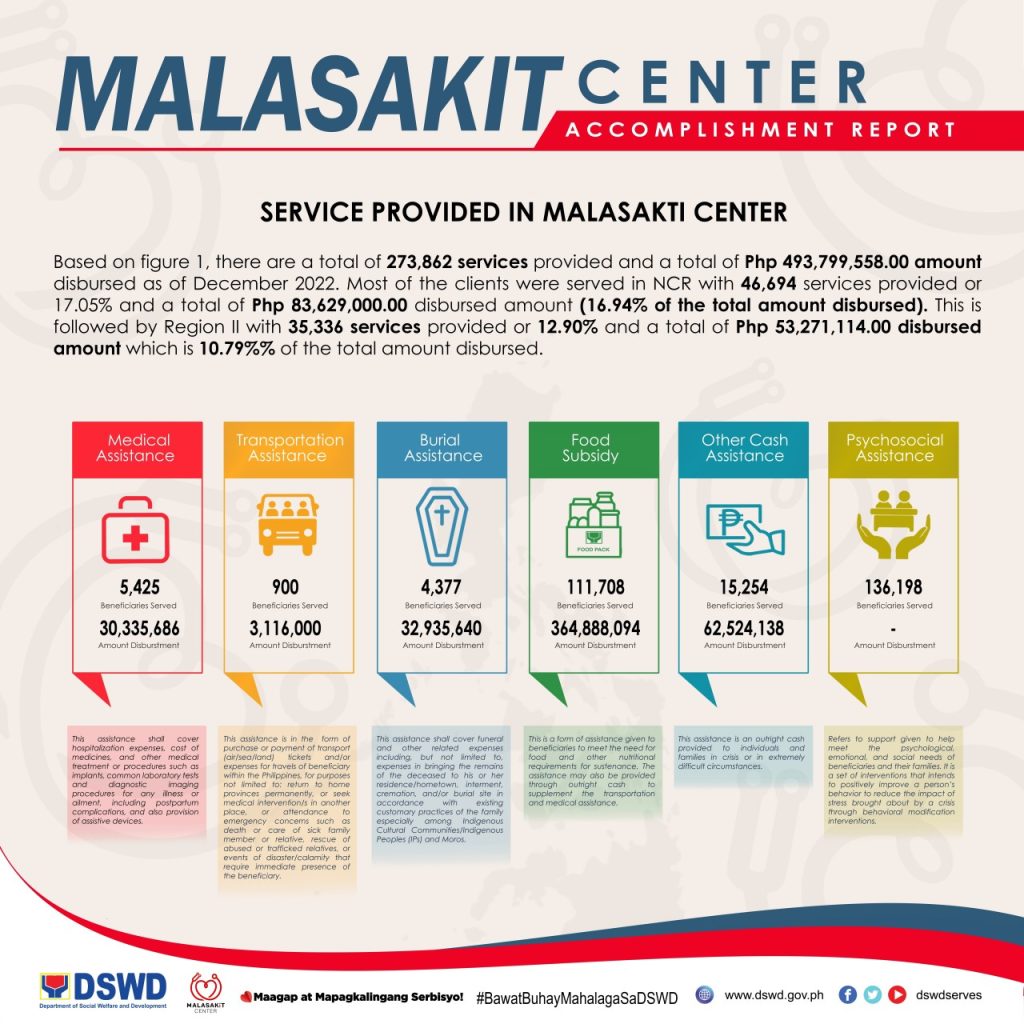
The Malasakit Center streamlines financial aid for indigent patients in DOH-retained hospitals, coordinating support from various government agencies. It primarily offers guarantee letters for hospital bills and medications rather than direct cash. The program aims to make medical and financial aid more accessible to low-income patients.
Department of Health (DOH) Cancer Support and Palliative Medicine Access Program (CSPMAP)
DOH CSPMAP provides free cancer medicines through accredited facilities, aiming to reduce out-of-pocket costs for patients. It is part of the National Integrated Cancer Control Program and supplements other financial support mechanisms. The program focuses on enhancing access to cancer treatment and prevention.
DMW Agarang Kalinga at Saklolo para sa mga OFWs na Nangangailangan (AKSYON) Fund
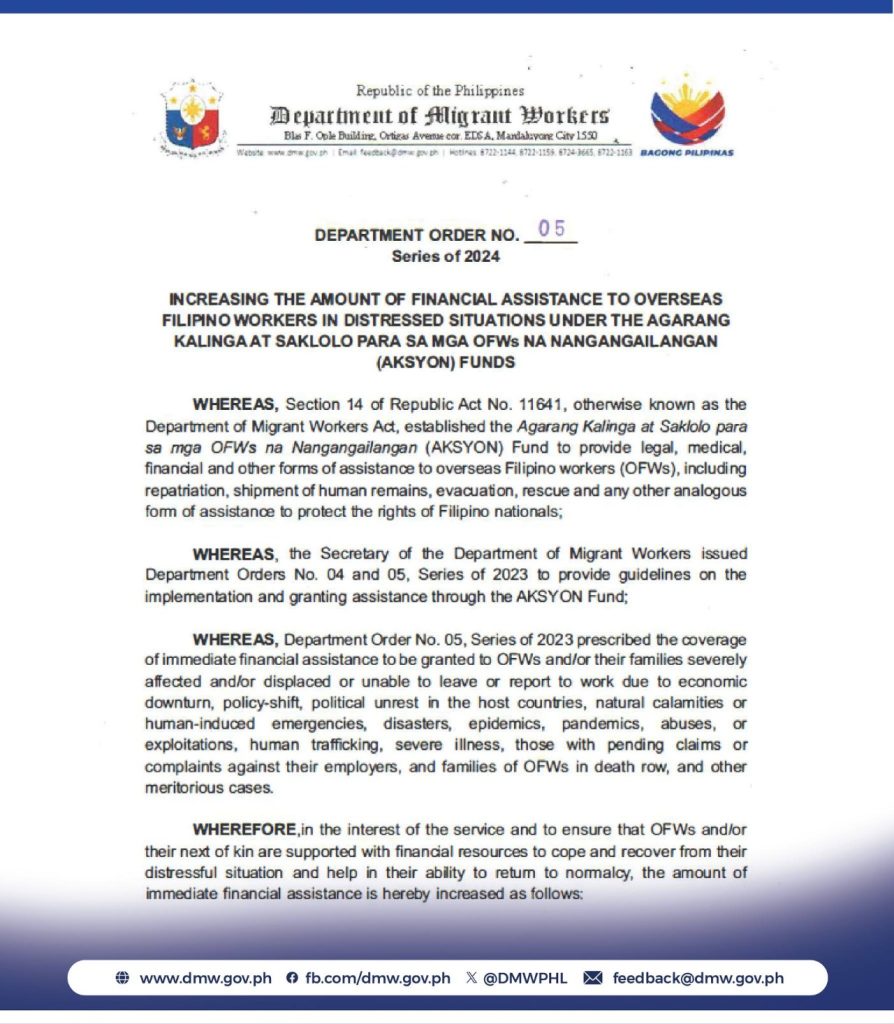
The AKSYON Fund, established under Republic Act No. 11641, provides urgent legal, medical, and financial assistance to overseas Filipino workers (OFWs) in distress. This DMW support includes repatriation, medical care, and aid for those affected by economic downturns, natural disasters, or exploitation. The financial aid varies from PHP 50,000 to PHP 100,000, depending on the severity of the situation and the beneficiary’s needs.
Livelihood Program for OFW Reintegration (LPOR)
The LPOR offers PHP 10,000 in cash assistance to eligible OFWs who have returned under distress or are undocumented. This support helps them with livelihood needs and reintegration into their communities. The program aims to ease the transition back to normal life and support their families.
Sa Pinas, Ikaw ang Ma’am at Sir (SPIMS)
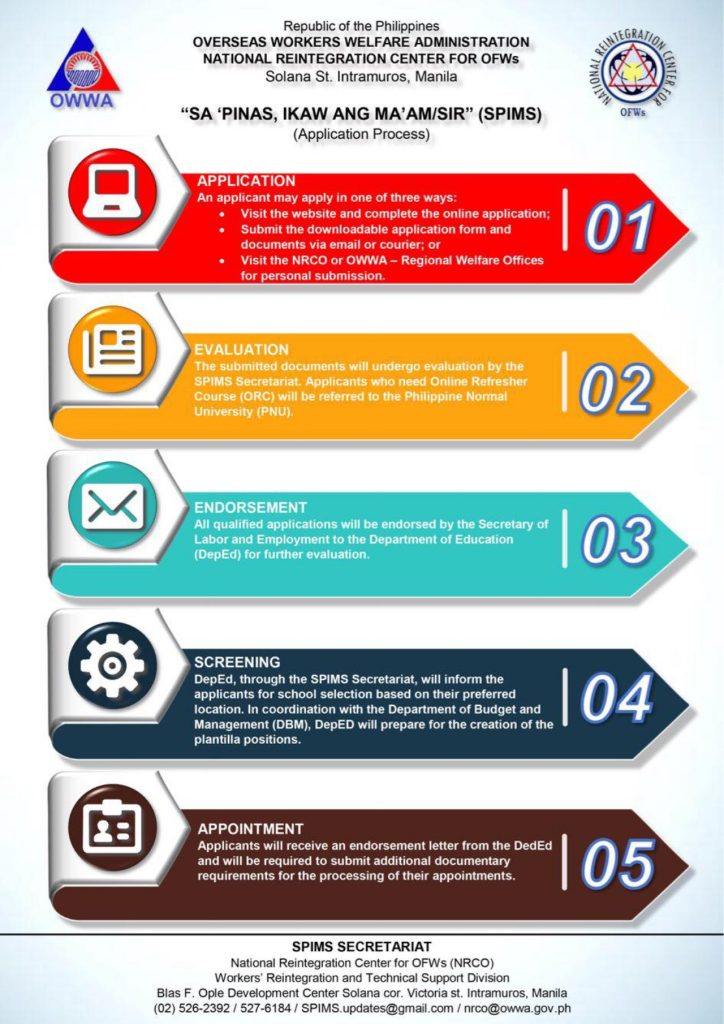
SPIMS is a reintegration initiative for OFW teachers who have passed the LET exam, facilitating their return to the Philippines to work in public schools. Managed by DOLE, OWWA, and NRCO, the program includes a PHP 20,000 cash incentive to help with teaching resources. It aims to ensure a smooth transition into the Philippine education system and support their career development.
Office of the President – Medical Assistance
The Office of the President offers financial aid for medical expenses, including serious conditions like cancer, via guarantee letters to hospitals. The program provides varying levels of assistance depending on the amount needed, with approvals required for amounts over ₱5,000. Assistance is granted every three months, with additional support subject to fund availability and justification.
Office of the Vice President (OVP) – Medical Assistance
The OVP provides financial support for cancer treatments such as chemotherapy and radiation therapy, ensuring that patients can access essential care without financial strain. This program aims to alleviate the burden of treatment costs for cancer patients.
OVP – Medical and Burial (MAB) Assistance Program
Funded by PAGCOR, the OVP MAB program offers medical and burial assistance to Filipinos, covering a wide range of medical services and treatments. It serves as an accessible source of aid for low-income families, supporting various medical needs including dialysis and chemotherapy.
Senate Public Assistance Office (SPAO) – Online Medical Assistance
The Senate provides an online platform for requesting medical assistance, covering hospital bills and medications. It is available to all constituents who need financial support for medical expenses in an attempt to offer accessible medical aid to those in need. To avail, applicants can submit requests online and receive financial aid for hospital bills and medications.
House of Representatives – Medical Assistance Program
The House of Representatives administers medical assistance programs, focusing on cancer patients through their representatives. It serves constituents requiring financial help with medical expenses by providing financial support and easier access to healthcare services. The program also offers financial aid for medical costs and access to government hospitals.
Video: Expanding Social Assistance in the Philippines
Discover how strong economic growth and targeted social assistance programs are transforming lives in the Philippines. Watch to see how ADB’s support for the government’s conditional cash transfer program is making a significant impact on poverty reduction and improving the future for millions of Filipino families.
Summary
Understanding and utilizing the various government financial programs available in the Philippines can significantly enhance your ability to manage unexpected challenges and support your well-being. Explore these resources and apply for the assistance you qualify for to make the most of the support available to you.
